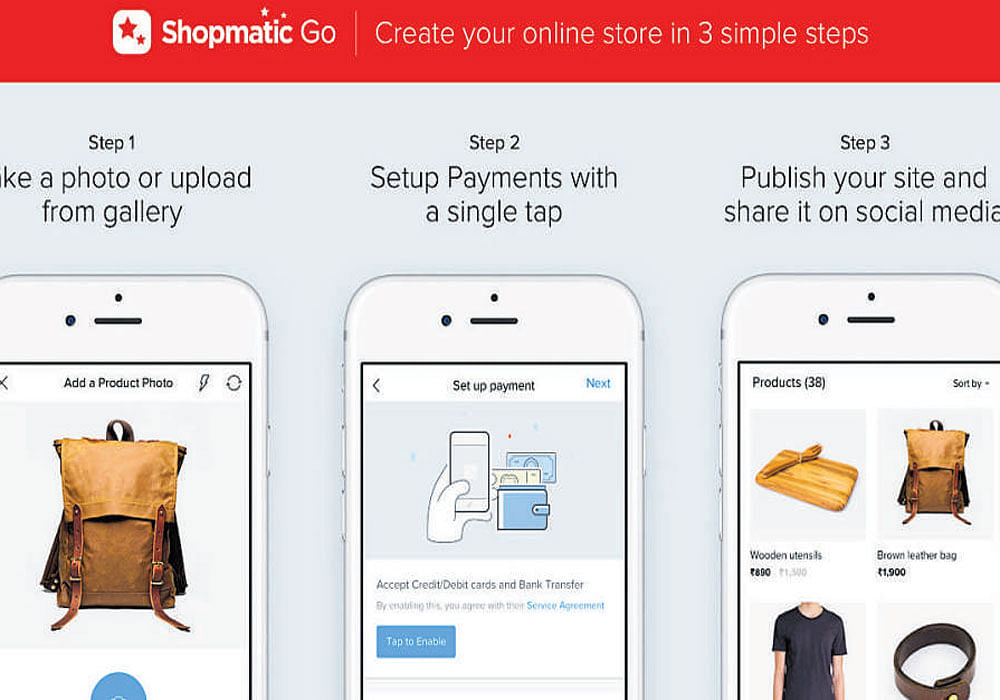Mobile app to help cottage entrepreneurs sell online
Last Updated IST

A screenshot of the app.
Bengaluru might be India’s startup capital. But the city’s cottage entrepreneurs, yearning to start small businesses with their handmade products, often find it tough to get noticed.
Flea markets do offer them an avenue to sell their products, but such events are so few and far between. Is ecommerce then their cup of tea? Not exactly. Sellers often complain that their products get lost in the ocean called Amazon or Flipkart. Not big enough to afford mobile apps or websites, they eventually give up their entrepreneurial dreams. This is exactly the problem the new players in the ecommerce space wants to disrupt.
Singapore-based Shopmatic is one of them. It has launched a free mobile app, Shopmatic Go that allows individuals and sellers to develop their own online stores. Sellers just need to snap pictures of their products, enable payments and sell by sharing on social channels, all from their smartphones.
Here’s how Shopmatic CEO Anurag Avula explains the process: “Someone in Bapuji market, Jaipur can sell their products to a buyer in Bengaluru, or a Madhubani artist in Bihar can sell their art to customers in Delhi, or a coffee trader in Coorg can sell to buyers in Mumbai.”
The app, he says, was built to reach sellers in metros, small towns and rural communities. The idea was to introduce them to the world of online commerce by democratising technology and disrupting the market. Since its launch in November 2016, Shopmatic Go has garnered about 60,000 sellers from metros and tier-2 and tier-3 cities.
Before the mobile app, Shopmatic had gone live with its ecommerce website in January 2016. It had offered small businesses options such as a domain name, store fronts with over 60 templates, payment gateways both domestic and international. The sellers could monitor orders, payments and shipments from a single panel management tool.
Besides, the small-time sellers could list their products on leading marketplaces such as Amazon and eBay and social selling channel, Facebook store. Data insights are offered through Google Analytics. Over 60% of the products sold through the web and mobile platforms are related to fashion, decor and artefacts, says Avula.
Growing mobile penetration, affordable data rates and the convenience of buying on the move are expected to boost the market further.
Flea markets do offer them an avenue to sell their products, but such events are so few and far between. Is ecommerce then their cup of tea? Not exactly. Sellers often complain that their products get lost in the ocean called Amazon or Flipkart. Not big enough to afford mobile apps or websites, they eventually give up their entrepreneurial dreams. This is exactly the problem the new players in the ecommerce space wants to disrupt.
Singapore-based Shopmatic is one of them. It has launched a free mobile app, Shopmatic Go that allows individuals and sellers to develop their own online stores. Sellers just need to snap pictures of their products, enable payments and sell by sharing on social channels, all from their smartphones.
Here’s how Shopmatic CEO Anurag Avula explains the process: “Someone in Bapuji market, Jaipur can sell their products to a buyer in Bengaluru, or a Madhubani artist in Bihar can sell their art to customers in Delhi, or a coffee trader in Coorg can sell to buyers in Mumbai.”
The app, he says, was built to reach sellers in metros, small towns and rural communities. The idea was to introduce them to the world of online commerce by democratising technology and disrupting the market. Since its launch in November 2016, Shopmatic Go has garnered about 60,000 sellers from metros and tier-2 and tier-3 cities.
Before the mobile app, Shopmatic had gone live with its ecommerce website in January 2016. It had offered small businesses options such as a domain name, store fronts with over 60 templates, payment gateways both domestic and international. The sellers could monitor orders, payments and shipments from a single panel management tool.
Besides, the small-time sellers could list their products on leading marketplaces such as Amazon and eBay and social selling channel, Facebook store. Data insights are offered through Google Analytics. Over 60% of the products sold through the web and mobile platforms are related to fashion, decor and artefacts, says Avula.
Growing mobile penetration, affordable data rates and the convenience of buying on the move are expected to boost the market further.